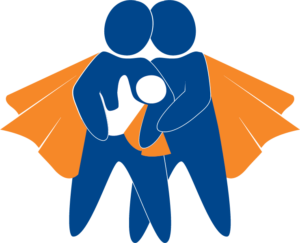Feeding and caring for your baby
Great start

Open conversations about feeding and caring for your baby. Talk with your midwife about getting ready to meet your baby and come along to our antenatal classes to find out more.
We will support you every step of the way and will let you know about local and national support.
- Free antenatal and breastfeeding class bookings
- Antenatal hand expressing leaflet
- Off to the Best Start leaflet
- How lactation works
- Positioning and Attachment video
- Skin to skin contact video
- How to help a breastfeeding mother video
- Best Beginnings – Baby Buddy App
- Breastfeeding Videos | Best Beginnings
- Best Beginnings premature birth videos
- NHS Healthy Start
Love

Your baby needs lots of love and cuddles.
Oxytocin is the love hormone that is released when you and your baby are close and it makes babies happy. Skin to skin is a great way to start, and do it for as long as you like, no matter how you feed your baby. If your baby is born premature, ask your nurse about kangaroo care.
- Building a happy baby
- Supporting love on the neonatal unit
- Skin to skin contact video
- Carrying baby in sling offers baby comfort and security. Follow TICKS checklist
Brain development

Comforting your baby helps them manage their emotions and helps their brain development.
Babies’ brains grow rapidly during the first 1,001 days between pregnancy and their second birthday.
Talk to your bump and feel your baby’s kicks.
Playing and singing with babies, builds brain connections and these positive experiences can last a lifetime.
Responsive feeding

Breastfeeding is more than food. It also calms and soothes your baby.
Respond to your baby’s early cues for hunger. Crying is a late cue.
Breastfed babies feed often, and cannot be overfed.
If feeding by bottle hold your baby close, look in their eyes and limit the number of people feeding your baby in the early days. This will help your baby feel safe and secure.
Safety

Keeping your baby safe – food, family and environment.
We will have conversations with you about keeping your baby safe including safe sleeping, stopping smoking and safe formula feeding.
We will share information with you about how to cope with infant crying.
- Safe sleeping
- Caring for your baby at night leaflet
- Help stopping smoking and e-cigarette information
- When your baby cries ICON
- Safe formula preparation – 1st milks only for 1 year. Prep machines not recommended.
- Formula milks in the UK
- Breastfeeding and medication – safety factsheets
- Medications whilst breastfeeding
Protection

Human milk protects both mothers and babies.
It is a living substance that changes day by day, feed by feed. Breastmilk protects babies from infections, allergies, diabetes, heart disease, childhood leukemia, obesity and SIDS. It protects mothers from breast cancer, ovarian cancer and osteoporosis. It protects premature babies from necrotising entercolitis. Babies don’t need any other fluid or food for the first 6 months. Every single drop is precious.
Postnatal support contacts
- Community midwives
- Breastfeeding support – West Sussex
- Breastfeeding support – Brighton & Hove
- La Leche League local support group
- La Leche league national helpline: 0345 120 2918
- NCT breastfeeding counsellor support line, 365 days a year 8am-midnight: 0300 330 0700
- National Breastfeeding Helpline, 9.30am-9.30pm 365 days a year: 0300 100 0212
At UHSussex we celebrate inclusivity and diversity and provide respectful care to all our LGBTQI+ families. Speak with us about your preferred language choices around infant feeding.
Access our padlet with links to lots of useful feeding resources